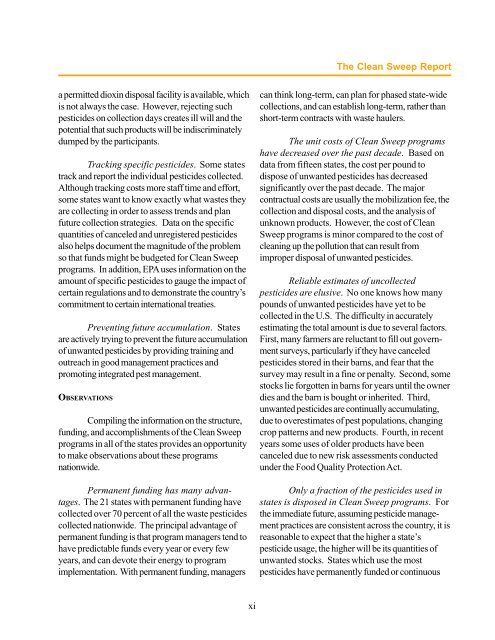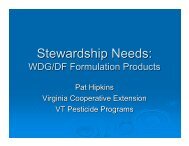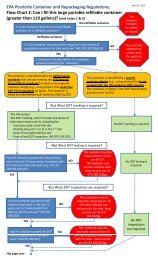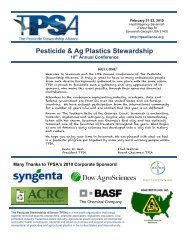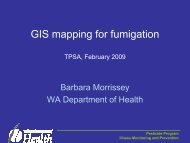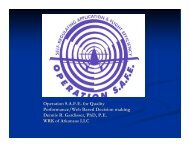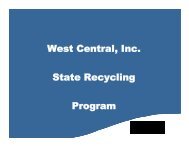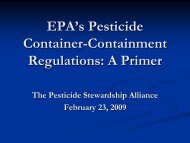Clean Sweep Programs - US Environmental Protection Agency
Clean Sweep Programs - US Environmental Protection Agency
Clean Sweep Programs - US Environmental Protection Agency
- No tags were found...
Create successful ePaper yourself
Turn your PDF publications into a flip-book with our unique Google optimized e-Paper software.
The <strong>Clean</strong> <strong>Sweep</strong> Reporta permitted dioxin disposal facility is available, whichis not always the case. However, rejecting suchpesticides on collection days creates ill will and thepotential that such products will be indiscriminatelydumped by the participants.Tracking specific pesticides. Some statestrack and report the individual pesticides collected.Although tracking costs more staff time and effort,some states want to know exactly what wastes theyare collecting in order to assess trends and planfuture collection strategies. Data on the specificquantities of canceled and unregistered pesticidesalso helps document the magnitude of the problemso that funds might be budgeted for <strong>Clean</strong> <strong>Sweep</strong>programs. In addition, EPA uses information on theamount of specific pesticides to gauge the impact ofcertain regulations and to demonstrate the country’scommitment to certain international treaties.Preventing future accumulation. Statesare actively trying to prevent the future accumulationof unwanted pesticides by providing training andoutreach in good management practices andpromoting integrated pest management.OBSERVATIONSCompiling the information on the structure,funding, and accomplishments of the <strong>Clean</strong> <strong>Sweep</strong>programs in all of the states provides an opportunityto make observations about these programsnationwide.Permanent funding has many advantages.The 21 states with permanent funding havecollected over 70 percent of all the waste pesticidescollected nationwide. The principal advantage ofpermanent funding is that program managers tend tohave predictable funds every year or every fewyears, and can devote their energy to programimplementation. With permanent funding, managerscan think long-term, can plan for phased state-widecollections, and can establish long-term, rather thanshort-term contracts with waste haulers.The unit costs of <strong>Clean</strong> <strong>Sweep</strong> programshave decreased over the past decade. Based ondata from fifteen states, the cost per pound todispose of unwanted pesticides has decreasedsignificantly over the past decade. The majorcontractual costs are usually the mobilization fee, thecollection and disposal costs, and the analysis ofunknown products. However, the cost of <strong>Clean</strong><strong>Sweep</strong> programs is minor compared to the cost ofcleaning up the pollution that can result fromimproper disposal of unwanted pesticides.Reliable estimates of uncollectedpesticides are elusive. No one knows how manypounds of unwanted pesticides have yet to becollected in the U.S. The difficulty in accuratelyestimating the total amount is due to several factors.First, many farmers are reluctant to fill out governmentsurveys, particularly if they have canceledpesticides stored in their barns, and fear that thesurvey may result in a fine or penalty. Second, somestocks lie forgotten in barns for years until the ownerdies and the barn is bought or inherited. Third,unwanted pesticides are continually accumulating,due to overestimates of pest populations, changingcrop patterns and new products. Fourth, in recentyears some uses of older products have beencanceled due to new risk assessments conductedunder the Food Quality <strong>Protection</strong> Act.Only a fraction of the pesticides used instates is disposed in <strong>Clean</strong> <strong>Sweep</strong> programs. Forthe immediate future, assuming pesticide managementpractices are consistent across the country, it isreasonable to expect that the higher a state’spesticide usage, the higher will be its quantities ofunwanted stocks. States which use the mostpesticides have permanently funded or continuousxi


